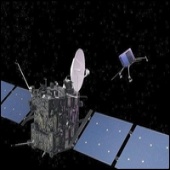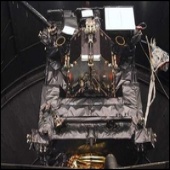ESA Science & Technology - News Archive
News archive
News archive
With the launch of ESA's comet chaser scheduled for February 2004, the Rosetta team has been racing to meet a new challenge - a change of target.
Published: 28 October 2003
Published: 2 June 2003
New destination for Rosetta
Published: 28 May 2003
Published: 20 March 2003
Published: 20 January 2003
Published: 13 January 2003
Published: 7 January 2003
Published: 5 January 2003
Published: 17 December 2002
Published: 3 December 2002
Published: 20 November 2002
Published: 28 October 2002
Published: 16 October 2002
Published: 8 October 2002
Published: 13 September 2002
Published: 5 September 2002
Published: 20 August 2002
Published: 17 July 2002
Published: 3 July 2002
Published: 27 June 2002
—
20 Items per Page



















